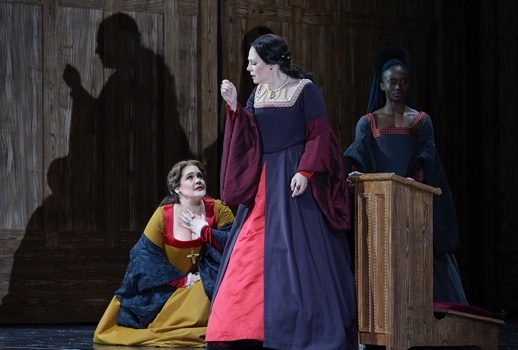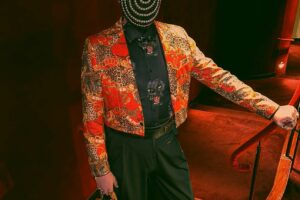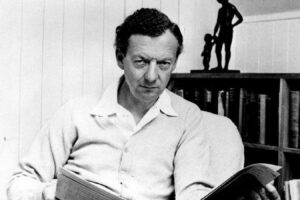

“The sets and costumes do the trick without causing any concern of reckless spending.”
When the Canadian Opera Company announced a new (to the COC, anyway) production of Donizetti’s Anna Bolena staring soprano Sondra Radvanovsky in the title role, I admit that I wasn’t as excited as I had been by the announcement of her previous COC roles—Aida, Elisabetta (in Robert Devereux) and Norma.
Of Donizetti’s three Tudor queens, Anna is the one that had seemed the least congenial fit in her Metropolitan Opera traversal of the roles. And after her Toronto Norma, I was ready to close the chapter on her bel canto efforts and was eager to hear more of her in Verdi.
Then she surprised me (and no doubt others) by topping herself in the Met season opener of Norma. I thought I had seen and heard everything she had to offer in the role and was pleasantly proven wrong by her commanding and moving interpretation. I went to the opening night of the COC Anna Bolenaw ith new interest. And by the end of the first act, it was clear to me that I was experiencing an artist performing at her absolute peak, a singer worthy of the title prima donna assoluta.
This production concludes the COC’s traversal of the so-called Tudor queens trilogy of Gaetano Donizetti, but it is not the first time the opera has been performed at the company. In 1984, Joan Sutherland sang her first Anna Bolena here (with a cast that included Judith Forst, James Morris and a young Ben Heppner.)
For the trilogy, the COC has used the production commissioned by the Dallas Opera with director Stephen Lawless.All three operas use the same basic set—a facsimile of the Globe Theatre which invites the audience to view these fictionalized historical dramas as plays within plays. The members of court hover in the balconies, aggressively peering down with interest as the main players engage in conflict.
The main characters are all aware of the gazing eyes and frequently acknowledge the onlookers. In the second act, when Anna, her former lover Percy (Bruce Sledge), and her brother Rochefort (Thomas Goerz) defend themselves to the King, they direct their protestations to the onlookers above as much as they do their sovereign—keenly aware that they are being tried in the court of public opinion.
The three productions have been all similarly entertaining and slightly kitschy, with their share of strengths and misfires. During the overture, the audience gets a brief history of the English royal family in pantomime, while the surtitles convey key facts. In some cases, elements are played up to the point of overkill. Anna’s daughter, Elisabetta, has been added as a silent character.
Some of her scenes are effectively done. We see her playing with the young page, Smeton (Allyson McHardy). And she is shown to be the only source of happiness for her mother in this opera, which begins when her marriage is already in decline and King Enrico having made up his mind to be rid of her.
Other times, the mute role is overused. She appears on stage in the concluding seconds of the opera just as her mother is about to lose her head—an overstatement of a moment that is already dramatically potent. Worst of all, she’s caught in a literal tug-of-war between her parents in the act one finale. Eyes rolled.
Lawless also has a habit of asking his singers to spend too much time on the floor, either crouching or lying down. For large portions of the celebrated scene between Anna and her rival, Giovanna Seymour (Keri Alkema), both singers are crouched in their separate corners of the stage. Yes, they are both in turmoil but the effect is overdone and visually awkward.
For the most part, the interactions of the singers are well directed, avoiding stand-and-deliver staging and making compelling drama out of the scenes. The sets and costumes do the trick without causing any concern of reckless spending. In the crucial scene that plays out in Anna’s bedroom, there is a bed on stage that is comically small, a fact that is only highlighted when the towering bass Christian van Horn, casually reclines.
Radvanovsky has always been a sensitive actress but I’ve never seen her project such easy authority. This, combined with her vulnerability, allowed her to achieve tragic grandeur. Vocally, she has never sounded better. She has superb legato and not just in the lyrical sections which are her speciality—like the famous aria, “Al dolce guidami” in the final scene.
She showed marked improvement from previous years in her delivery of fiery passages, like the conclusion of the first act when Anna is told that her fate will be in hands of judges. Similarly, in the past, I’ve found her delivery of recitative pallid, but here, she delivered her lines with real intent, and her chest voice has never been stronger.
The voice has naturally lost some flexibility over the years but none of the coloratura passages fazed her. And while she does not have a brilliant trill, she never shirked them unlike many bel canto practitioners today.
Her high notes continue to be the glory of her large, complexly-textured voice and she delivered an array of soft and loud acuti. In the closing measures of the opera, I was delighted to hear that she did not drop out of the music just so she could save herself for one last high note. In confident form, Radvanovsky concluded her scene with a trill and a huge, if brief, high E-flat—possibly the loudest single note I’ve ever heard in person.
Radvanovsky was surrounded by a cast of fine voices. As her rival, Alkema (a past company Giuletta, Vitellia, and Tosca) did her finest singing on the COC stage to date, using her attractive, juicy lyric soprano with polish and panache. Dramatically, however, she had trouble creating a full-dimensional character beyond Giovanna’s perpetual state of agonized guilt.
As Anna’s erstwhile lover, Sledge displayed a bright, Italianate tenor, with pleasing squillo. He handled the high tessitura of the role well while avoiding extreme high notes. The only downside to his performance was a distracting shaking of his head whenever he ventured into his upper register, betraying a tension in his vocal production that is fortunately not audible.
As Enrico, van Horn was the only singer to perform at Radvanovsky’s level. I remember being impressed when I first heard his Colline a few years ago. Here, he gave a star-worthy turn, commanding the stage with easy swagger, and flaunting his big, vibrant basso cantateexcitingly.
He has been intriguingly cast in the Met’s revival of Boito’s rarely performed Mefistofele next season—a coveted role—and his performance here proved him to be deserving of such a high-profile assignment.
With his dry bass-baritone, Goerz sounded more like Anna’s father than her brother but acted touchingly. As Smeton, McHardy was always absorbing to watch and deployed her dark-hued lyric mezzo with style and feeling. As the slimy Hervey, who helps entrap Anna, tenorJonathan Johnson was so convincing that he received a few good-natured boos from the opening night audience.
On the podium, Corrado Rovaris led a lively performance from the COC Orchestra and provided fine support for the singers, though I would have like more bounce from the string section in some of the cabalettas.
While I’m a big fan of bel canto and Donizetti’s operas, I’ve often found this score to have its longeurs, especially in the first act. It is a credit to the performers that I had to remind myself of that opinion during this performance, so strong was the case they made for the composer’s first big hit.
Photo: Michael Cooper


























Comments